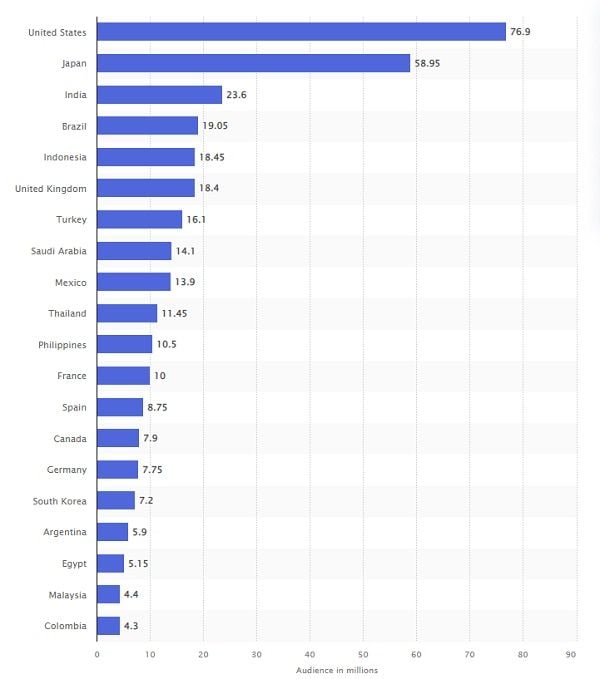Amid Elon Musk’s various claims about free speech, and enabling more types of content to remain on Twitter, one element that’s always struck me is his singular focus on the US, and the impact that Twitter, and any changes to its policies, will have on US politics.
But Twitter’s US audience makes up only 30% of Twitter’s total user base, with the platform also holding significant influence in many other regions.

As you can see in this chart, via Statista, while US users do make up the largest single region for Twitter users, overall, it has far more active users in other nations.
That means that any policy decision not only impacts the US, which is seemingly Elon’s key focus, but also every other region, and we’re already seeing how these updates can cause harm, in potentially major ways.
In Sudan, for example, Twitter’s team recently approved a Twitter Blue checkmark for a profile that claimed to represent Sudanese support forces, but was actually a fake account. The profile then tweeted that a key Sudanese military leader had been killed in combat, amid ongoing tensions in the region.
Twitter has since removed the misleading profile, but it’s an example of how Musk’s changes, which are focused on the US market, will have effects in other regions as well, many of which don’t have the same levels of digital literacy, while Twitter has also scaled back its local presence for many nations, making the verification of key details and people more difficult.
This has long been a challenge for social platforms more broadly. Facebook has been tagged as the source of various misinformation pushes that have led to violence and unrest in developing regions, with the platform often becoming the key source of news and information in these nations, leading to a more easily manipulated media.
The capacity to shape what users see also stems to political leaders, and the pressure that they can exert on platforms on this front – and data already shows that Twitter’s complying with far more government requests for action under Musk, particularly from Turkey and India.
As reported by Rest of World:
“Between October 27, 2022 and today, Twitter received a total of 971 requests from governments and courts. These requests included orders to remove controversial posts, as well as demands that Twitter produce private data to identify anonymous accounts. Twitter reported that it fully complied in 808 of those requests, and partially complied in 154 other cases.”
The data shows that, overall, government requests to Twitter have more than doubled since Musk took over at the app, and that Twitter’s compliance rate for such has increased from around 50% on average, to 80%.
That’s also in line with reports that Twitter’s blocked hundreds of user accounts at the request of the Indian Government under Elon. And when you also consider that Musk’s other business, Tesla, is looking to work with Indian authorities on potential expansion in the market, the broader picture of government censorship, and how Twitter will police such moving forward, starts to take on a whole new shape.
But not in the US. Thus far, Elon’s made a big show of facilitating more free speech for US users, but seemingly, that same approach, at least in a conceptual sense, is not extending to other regions. Which may be winning Musk support among sections of the US audience, but it could have big implications for those in many other markets.
It’s worth taking this into consideration, and measuring Twitter’s efforts to address such concerns as they relate to the other 70% of its user base. Under Elon, other regions may not get the same level of care and consideration, and while Musk has repeatedly noted that Twitter will adhere to the laws of each region, its lax approval process for Twitter Blue, and lack of on-the-ground insight, could end up causing significant damage, and facilitating the spread of even more harmful misinformation and propaganda.
I mean, Twitter also approved the accounts of various Taliban leaders for the vaunted blue check, while it’s also removed previous warnings on Chinese and Russian state media.
At best, this reflects a lack of due diligence in its processes, while at worst, it shows that Twitter 2.0 doesn’t really care about free speech, but more about what conflicts with Elon’s personal ideologies.



